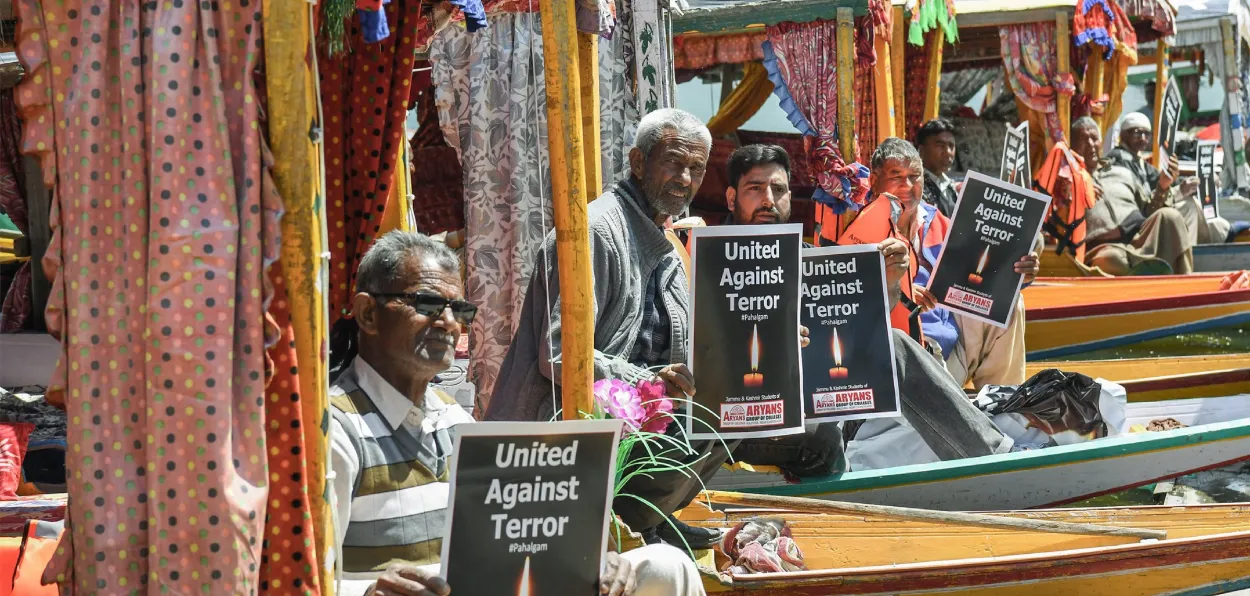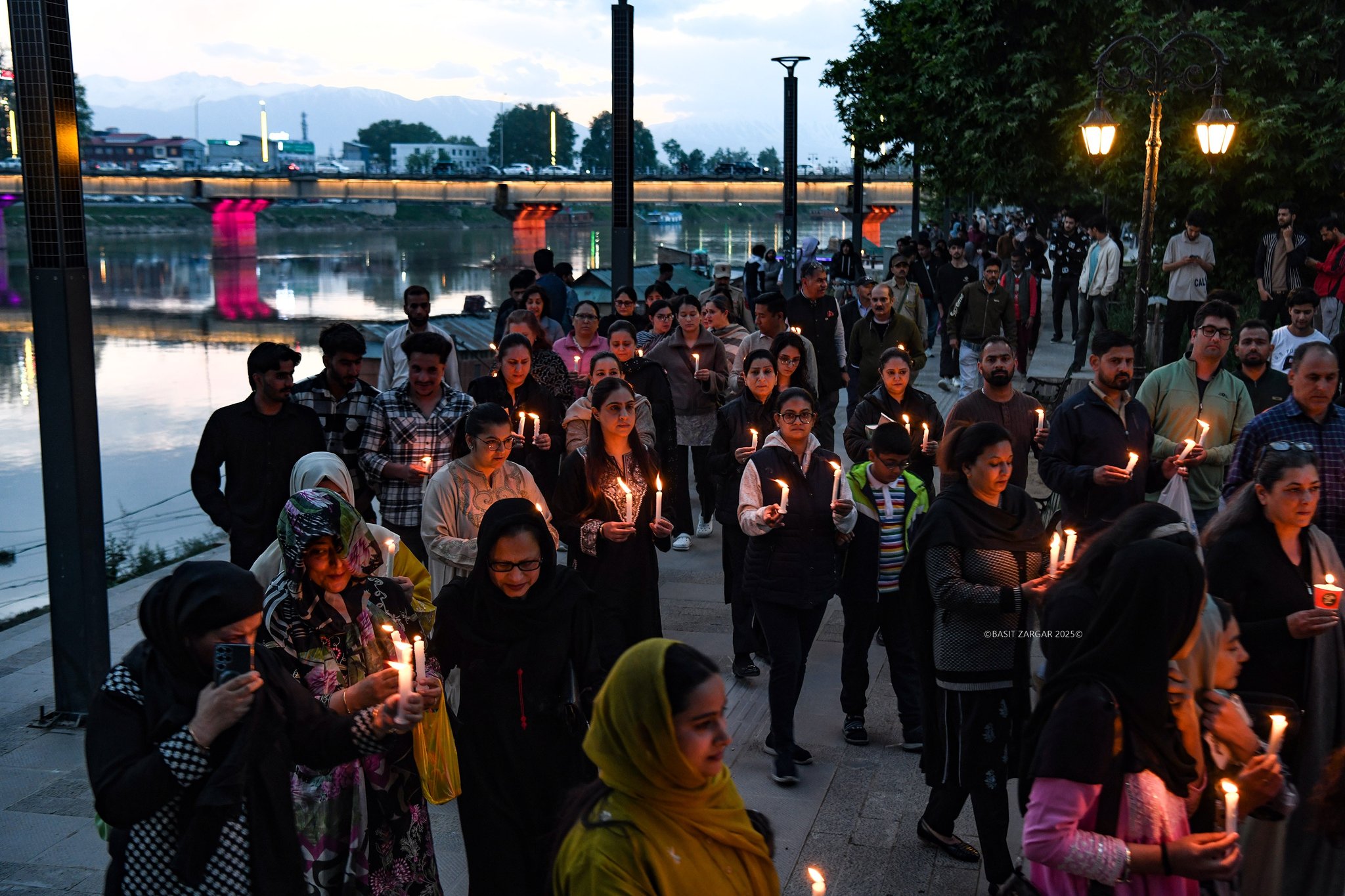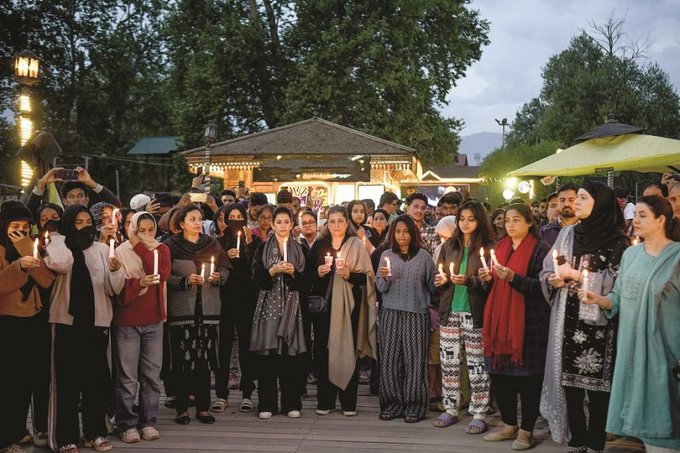
Amir Suhail Wani
The soul of Kashmir is bullet-ridden once again. An eerie aura of mourning hangs in the air—permeating spaces from dining tables in modest homes to the bustling heart of Srinagar’s city centre. The recent massacre in Pahalgam, where 25 innocent tourists and a Kashmiri who took them to azure meadow of Baisaran were killed and scores left injured, has shaken the collective conscience of the Valley. This atrocity, perpetrated in cold blood, has plunged the region into an abyss of despair, trauma, and an overwhelming sense of loss.
The people of Kashmir—across all walks of life—have unanimously condemned this heinous act. Yet, no amount of condemnation can bandage the open wounds left by this carnage. The streets, once filled with the aroma of Rogan Josh and the chatter of locals and visitors alike, now bear the pungent, surreal smell of blood. The pervasive dread and sorrow have robbed the Valley of its rhythm.
This is not just the loss of 26 lives—it is an assault on humanity. In Kashmir, where every household is familiar with grief, this tragedy reverberates deeper. It is as though a tear has appeared in the fabric of our collective soul, and no gesture, no condolence, can truly heal it.
Two days later, the Valley began to function again. Traffic jams, reopened shops, and murmuring street vendors might suggest that normalcy has returned. But this is a haunted normalcy—one that conceals grief behind the façade of routine. Mass demonstrations were held across the region yesterday, with people—young and old, men and women—shouting in unison: "Not in our name!"
They raised their voices not just for the victims, but also in defense of their own identities. "Not in the name of our religion. Not in the name of our land." These words are echoes of collective anguish—a desperate attempt to reclaim the soul of Kashmir from those who have twisted its essence for their violent ends.
 In Srinagar, women take a candlelight march in memory of the victims of Pahalgam terror strike
In Srinagar, women take a candlelight march in memory of the victims of Pahalgam terror strike
Kashmir has historically been a cradle of civilizations, a melting pot of diverse philosophies, and a sanctuary for spiritual seekers. It was here that the Fourth Buddhist Council was held under the patronage of Emperor Kanishka in the 1st century CE, cementing Kashmir's place in the history of Buddhism.
Later, the great Adi Shankara, the 8th-century Hindu philosopher and theologian, journeyed to Kashmir to attain a final spiritual realization at what is now known as Shankaracharya Hill. His journey symbolized the union of knowledge (Jnana) and devotion (Bhakti), central to Kashmir’s ethos.
In the 14th century, Mir Sayyid Ali Hamadani, a Persian mystic, arrived in Kashmir with 700 followers. He not only spread the light of Islam but also laid the foundations of a syncretic culture that combined Persian mysticism, local spirituality, and artisanal excellence. His influence on Kashmiri Islam is still celebrated in the shrines that dot the landscape and in the traditions of Kashmiriyat—a culture of communal harmony, tolerance, and unity.
This land has never belonged to violence. In its Kehwa—a sweet beverage brewed with cardamom, saffron, and almonds—are mixed millennia of love, hospitality, and inclusivity. Its rivers, which journey through India, Pakistan, and China, remind us that Kashmir is more than a territory—it is a spiritual and cultural legacy shared by humanity.
The violence in Pahalgam is not merely a crime against individuals—it is a sacrilege against the soul of Kashmir. It throws the people into an existential crisis, both moral and psychological. The contrast is stark and heart-wrenching: a land known for Rishis and Sufis now finds itself synonymous with unrest, militarization, and bloodshed.

Kashmirs in Grief - a candlelight march against terrorism
The youth, already plagued by unemployment and political disillusionment, now inherit an even darker legacy—one that risks breeding cynicism and hopelessness. Each act of terror distances Kashmir further from its true self and aggravates the ongoing identity crisis.
This is no time for political bread-baking or ideological posturing. The massacre calls not just for investigation and justice, but for deep introspection. It compels us to ask difficult questions: What forces have led to this recurring cycle of violence? What systemic failures have contributed to the radicalization of some? Who benefits from keeping the Valley in turmoil?
Yet amid the ruins of tragedy lies a fragile hope: that this event may reunite the fractured spirit of Kashmir. That it may push us to come together—not just to mourn, but to take action. We must challenge the structures that perpetuate violence and empower those voices—of peace, wisdom, and unity—that have always defined this land.
Kashmiris have always known how to survive, and how to resist despair. But now, the need is not just survival—it is reclamation. Reclaiming the image of Kashmir as a land of wisdom, spirituality, and cosmic hospitality. Reclaiming the memories of Hazratbal’s serenity, Dal Lake’s reflections, and the whispers of Chinars in the autumn breeze.
If this place once attracted saints, sages, and mystics, it still holds the potential to radiate light once more. But it will take effort—from policymakers, educators, community leaders, and each citizen—to ensure that no more bullets tear through its soul.
ALSO READ: Bhattacharya family escaped from terrorists' guns in Pahalgam by reciting Kalma
Kashmir belongs not to the perpetrators of terror, but to every soul that believes in compassion, dignity, and the sanctity of life.
Let this moment not pass in silence. Let us transform grief into resolve. Let us remind the world: Kashmir is not the land of terror—it is the land of transcendence.
